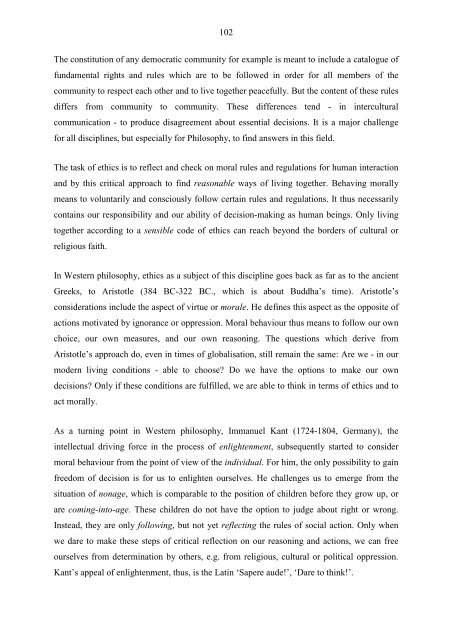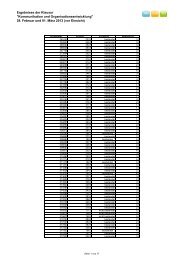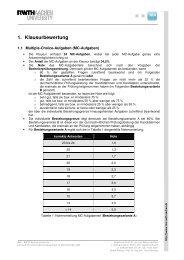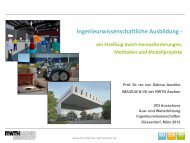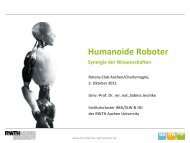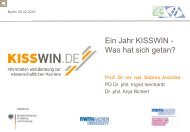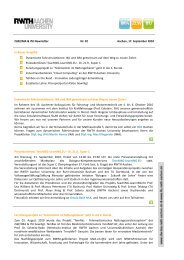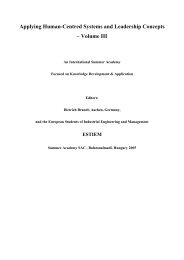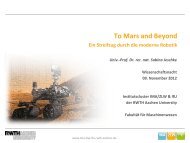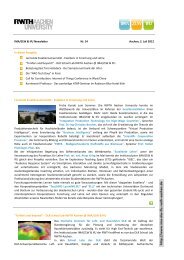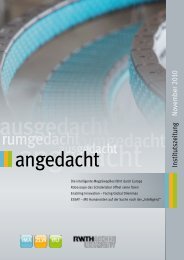Vol. II: Shaping Information and Communication ... - IMA,ZLW & IfU
Vol. II: Shaping Information and Communication ... - IMA,ZLW & IfU
Vol. II: Shaping Information and Communication ... - IMA,ZLW & IfU
You also want an ePaper? Increase the reach of your titles
YUMPU automatically turns print PDFs into web optimized ePapers that Google loves.
102<br />
The constitution of any democratic community for example is meant to include a catalogue of<br />
fundamental rights <strong>and</strong> rules which are to be followed in order for all members of the<br />
community to respect each other <strong>and</strong> to live together peacefully. But the content of these rules<br />
differs from community to community. These differences tend - in intercultural<br />
communication - to produce disagreement about essential decisions. It is a major challenge<br />
for all disciplines, but especially for Philosophy, to find answers in this field.<br />
The task of ethics is to reflect <strong>and</strong> check on moral rules <strong>and</strong> regulations for human interaction<br />
<strong>and</strong> by this critical approach to find reasonable ways of living together. Behaving morally<br />
means to voluntarily <strong>and</strong> consciously follow certain rules <strong>and</strong> regulations. It thus necessarily<br />
contains our responsibility <strong>and</strong> our ability of decision-making as human beings. Only living<br />
together according to a sensible code of ethics can reach beyond the borders of cultural or<br />
religious faith.<br />
In Western philosophy, ethics as a subject of this discipline goes back as far as to the ancient<br />
Greeks, to Aristotle (384 BC-322 BC., which is about Buddha’s time). Aristotle’s<br />
considerations include the aspect of virtue or morale. He defines this aspect as the opposite of<br />
actions motivated by ignorance or oppression. Moral behaviour thus means to follow our own<br />
choice, our own measures, <strong>and</strong> our own reasoning. The questions which derive from<br />
Aristotle’s approach do, even in times of globalisation, still remain the same: Are we - in our<br />
modern living conditions - able to choose? Do we have the options to make our own<br />
decisions? Only if these conditions are fulfilled, we are able to think in terms of ethics <strong>and</strong> to<br />
act morally.<br />
As a turning point in Western philosophy, Immanuel Kant (1724-1804, Germany), the<br />
intellectual driving force in the process of enlightenment, subsequently started to consider<br />
moral behaviour from the point of view of the individual. For him, the only possibility to gain<br />
freedom of decision is for us to enlighten ourselves. He challenges us to emerge from the<br />
situation of nonage, which is comparable to the position of children before they grow up, or<br />
are coming-into-age. These children do not have the option to judge about right or wrong.<br />
Instead, they are only following, but not yet reflecting the rules of social action. Only when<br />
we dare to make these steps of critical reflection on our reasoning <strong>and</strong> actions, we can free<br />
ourselves from determination by others, e.g. from religious, cultural or political oppression.<br />
Kant’s appeal of enlightenment, thus, is the Latin ‘Sapere aude!’, ‘Dare to think!’.


